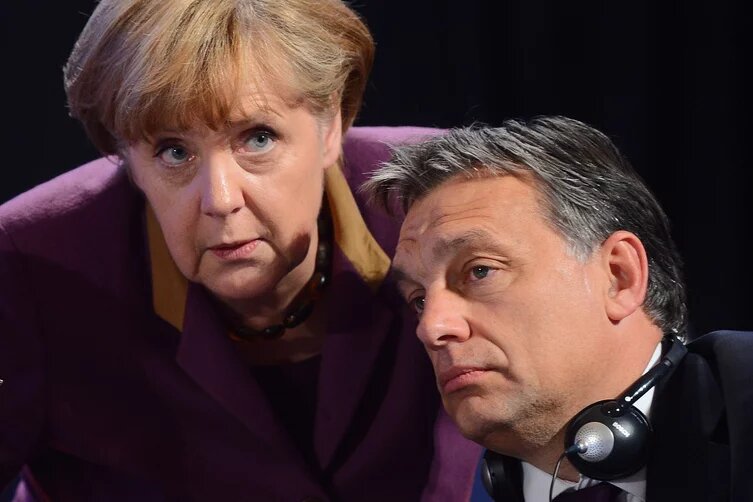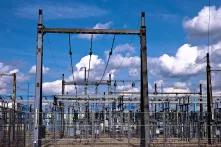
On 2 February, Angela Merkel visits Hungary. The German-Hungarian friendship has undergone fundamental changes in the recent past - and the rewriting of Germany’s Russia policy also entails reshaping its ties to Hungary.
There is much speculation surrounding the German chancellor’s visit to Hungary in February. Realistically, we cannot expect her to topple the Orbán regime, but nor is her trip going to be mere protocol and smiles. She will bring with her a message: quite a few of the keystones of the German-Hungarian friendship have undergone fundamental changes in the recent past. And the rewriting of Germany’s Russia policy also entails reshaping its ties to Hungary. In the future, there will be no trickery, no friendly gestures towards Putin; Hungary would be in real trouble without its well-oiled German ties, so after five years of misguided policies, Orbán should concentrate on providing appropriate solutions to the real problems of Hungary’s energy policy.
On 2 February, Angela Merkel will pay a visit to Hungary for a few hours, during which she will meet with Prime Minister Viktor Orbán. This is all that is officially known about the German chancellor’s visit; the public has no knowledge of the agenda or even the subject of the talks or possible agreements to be reached. And while such proceedings are deemed normal by the Hungarian government and we might easily have become accustomed to such a lack of openness (we knew nothing about the visits to Moscow by either the prime minister or his minister of foreign affairs, Péter Szijjártó, nor do we know anything about Orbán’s increasingly regular visits to Switzerland or their purpose, content or results), much speculation still surrounds Merkel’s visit.
This is understandable, since for a long time the prime minister’s foreign affairs calendar has consisted of visits by pocket dictators primarily from the Middle East and the Caucasus, and it has been quite a while since he has hosted an international meeting of such significance in Budapest. What could Merkel possibly want and what could Orbán get? Could the negotiations result in any changes whatsoever in the direction of Hungary’s government policy, in the government itself, or in the orientation of its foreign affairs? Opinions vary widely: Merkel is bringing Orbán the silk rope; she has had enough; they will negotiate an agenda of orderly retreat, stabilising the situation and shifting the direction of policy after a change of government – these are some of the bolder visions.
Relaxing the deficit will not be tolerated
Germany has always pulled its shield over Hungary: as long as German companies receive distinguished state funds and as long as Orbán – albeit rudely and from the European Union’s perspective in an unacceptable manner – speaks Merkel’s most secret thoughts, he can count on the support of Europe’s most important government. It is the perpetuation of this tacit agreement that will be the subject of their meeting, say others. Indeed, what will happen? Probably none of the above, but certain issues of key importance to Hungary will definitely be mentioned.
Merkel’s two-sided attitude towards the Fidesz regime in the last five years is a fact. There are three major areas that are of key importance to Germany in the evolution of its relationships with the EU states of Central Europe, the first of which is financial stability. In the midst of the Eurozone crisis and at the centre of a 240-billion-euro Greek bailout, it is of primary importance to Germany that no new crises requiring tens of billions in bailouts emerge on the EU’s eastern periphery. The Hungarian government has met this expectation. During his memorable trip to Brussels in the summer of 2010, Orbán received an unambiguous warning: he could do whatever he wanted within certain limits, but relaxing the deficit, undermining the stability of the budget, and loose fiscal or monetary policy would not be tolerated.
The prime minister got the message: in short order, the fight against the national debt became the ultimate purpose of the Hungarian people’s thousand-year mission, and the Matolcsy stimulus programme envisioning a 7% expansion was quickly withdrawn from the agenda. To the contrary, what Hungary got were ultra-orthodox, financially restrictive policies which stunned even conservative former Finance Minister Lajos Bokros and which even caused the IMF – surprisingly confusing its own role – to advise fiscal loosening. The result is comforting from the German perspective: the deficit has been below 3% for years now; the national debt, while not decreasing, is at least nearly stagnant; and Hungary’s balance of payments is stable.
Energy sector under pressure
A Hungarian bailout or financial respirator paid for by German taxpayers will not be necessary. Please, there is nothing to worry about here! The objective has been achieved; the manner in which this was accomplished (by gutting of social welfare, education, and health care systems, etc., resulting in the intentional fragmentation of society) is an internal affair – a problem of the Hungarian electorate, who, the Germans note, have repeatedly expressed their approval of such policies during the past year.
The second strategic area is the situation of German companies and investments. It may seem that with Orbán’s poster campaign against multinational companies, the Hungarian government has really stepped on Germany’s toes this time. We should think again, however. Behind the campaign’s slogans, there lies a chaotic fusion of support policies which are incredibly difficult to unravel. It does seem that certain multinational companies, primarily banks and small retail chains, are indeed targets of the Orbán government. Interestingly, however, these are precisely the areas where German capital does not have a significant presence.
Notably, Hungary’s only large German-held bank, MKB Bank Zrt, was just sold to the Hungarian state by its German owner, Bayerische Landesbank, and the key players in the retail sector – Tesco, Auchan and Spar – are not German either. So where is German capital concentrated? In automobile manufacturing, information technology, energetics and insurance. Of Hungary’s top 40 corporations, those which are German-owned – Audi, E.ON, RWE, Hungarian Telekom, Bosch, Allianz and Continental – are all in these industries. The energy sector is indeed under pressure, but the bitter pill has been made consumable by stunningly generous government offers, for example in the case of E.ON, whose gas business was recently bought by the Hungarian state-owned power company MVM for multiples of its appraised market value.
This comes at a time when E.ON is restructuring and spinning off its assets in fossil fuels, a dominant market factor in Hungary, to concentrate on new (primarily renewable) technologies. The automobile industry, including Audi and Mercedes, is a state within a state, the hallmark of the Orbánesque “labour-based society” and the beneficiary of unlimited and sometimes even undeclared tax allowances, so it has absolutely nothing to complain about. While Deutsche Telekom (DT) was impacted by new taxes levied on the telecommunications sector, a planned internet tax, for example, which could have caused headaches for the IT sector, has failed. Indeed, the sacking of the editor-in-chief of news portal Origo (which is majority-owned by DT’s Hungarian subsidiary) and DT’s agreement with the Hungarian government on IT development suggest that a separate and unique bargain has been struck with DT and that the machine as a whole is well-oiled. The fate of German companies under Orbán’s System of National Cooperation (NER), therefore, is not at all miserable.
Can Merkel play the role of the great consolidator?
The third key area from the German perspective concerns the decision-making at the EU level and the debates surrounding the EU’s future. We can envision more conflicts in this area than in the other two. Orbán’s criticism of Brussels, his failure to support Jean-Claude Juncker’s appointment as European Commission President, and his eagerness to promote the anti-integration, state-sovereignty-activist, Cameron agenda would seemingly evoke German disapproval. But the Hungarian government has withdrawn from precisely this area in the recent past; the Brussels = Moscow equation is no longer the centrepiece of its communication strategy (nowadays, it’s impolite to place Moscow in any kind of negative context anyway), as Orbán’s NER has found a new arch-enemy in the United States.
In addition, although Angela Merkel’s commitment towards Europe is unquestionable, the Europe she is committed to is best achieved through Germany and the German government, and the efforts of the European Commission and the European Parliament had better have their healthy limits. In the balance of power between state sovereignty and European institutions, the scale had better lean towards the former. And it’s fine if others say it out loud instead of her. If they do so rudely, she’s not happy, but she can live with it. If Juncker is criticised and thus weakened by others so that he knows his place, and Merkel can play the role of the great consolidator who eventually takes care of the Commission President’s appointment, that benefits her first and foremost. There is no big deal here.
Finally, there is one additional issue in connection with the Central and Eastern European states which is not of a strategic nature for Germany, which is exactly what makes it important. This is the question of Hungary’s relationship to Russia. Orbán’s opening towards the East and ever-growing love for Russia have led to outrage on many occasions: Warsaw, Vilnius, Riga, Tallinn and, as of late, Washington, to mention just a few. Not Berlin, though. Berlin is lenient on this matter, due to Germany’s unique relationship with Russia. We could go on at great length about the elements of this relationship – from Ostpolitik to North Stream to investments in Russia by large German companies. This is why, although Orbán is not welcome in many capitals around the world, the Germans have nothing bad to say about him.
What follows from all this is that the purpose of Angela Merkel’s visit to Budapest will indeed be to reinforce this tacit agreement and to warn Orbán to restrain himself somewhat, if possible. She is not the kind of leader who interferes in the internal affairs of member states anyway, and she is trying to avoid the appearance of German super-dominance in the EU (although I reckon the Greeks might have something to say about that).
The crucial shift in German foreign policy
This is not the purpose of Angela Merkel’s visit, however, and for two reasons. On the one hand, it is possible that Angela Merkel does not mind if during peacetimes the leaders of certain member states question the distribution of power and authority between member state governments and EU institutions. But she is quite determined that, should the EU face a conflict with external actors, then a unanimous voice and joint action are required. In such times, there is no place for unilateral experiments or actions carried out behind the back of a joint multilateral policy, thus undermining its effectiveness. With his well-known and spectacular antics, Orbán is consistently able to utter sentences and carry out actions that are discussed under “things you should never do” at the very first session of a diplomacy seminar.
Most recently, he has proven himself yet again at the memorial held in Paris in the aftermath the terrorist attack on Charlie Hebdo. Playing trickery on the issue of South Stream to the advantage of Russia in the midst of the Ukrainian crisis (laying the groundwork for Gazprom by amending laws to evade EU regulations), shutting off the gas supply through which Europe is trying to keep Ukraine alive, committing itself for decades to Russian money, technology and supplies by signing secret contracts to expand the Paks Nuclear Power Plant – this is exactly the kind of back-stabbing I have in mind.
On the other hand, Hungary’s devastated foreign affairs apparatus failed to see and warn Orbán about a crucial shift in German foreign policy – the direction of its stance on Russia. In contrast to Orbán’s valueless, purely utilitarian yet ill-conceived foreign policy, the unique relationship between Germany and Russia is not based on economic interests alone. Of course, they like making good deals, but there are additional underlying aspects of this relationship. Close German-Russian economic cooperation, for example, could have a stabilising effect on Russia, reducing the likelihood of aggressive geopolitical actions. Economic cooperation may also contribute to modernising the Russian economy and expanding its links to the global economy far beyond energy exports.
Between Europe and Russia, there can be no trickery
This, in turn, would give Russia a greater interest in sustaining the balance of international relationships and could perhaps ameliorate Russia’s troublesome foreign policy. But Germany has become disillusioned with these presuppositions and hopes. One cannot discern the slightest traces of modernisation in the Russian economy. Orbán’s characterisation of Russia as a “star of international analyses” in a speech delivered last year in Romania was simply self-confidence driven by high oil prices and not some new model of economic policy. Indeed, due to its lack of modernisation, the Russian market has become devoid of value even for those German companies which had been hoping to export technology there, and Russia’s economic weight is becoming even less significant with the rapid decline in oil prices.
Hopes of stabilisation have also failed to materialise; Russia did not become more moderate as a result of economic cooperation. To the contrary, its economic strength fuelled by high oil prices actually led Russia to pursue its perceived interests even more aggressively, and rendered its foreign policy unpredictable. Putin appears to be driven primarily by imperial, rather than economic, rationality. Moreover, the invasion of Crimea and the destabilisation of eastern Ukraine have convinced Germany that peaceful approaches and methods based on consensus-building are simply not an effective way of dealing with Putin’s Russia.
All this has led Merkel and her team to re-evaluate the Russian relationship, and by last autumn she had placed harsh measures – the persistent pursuit of sanctions and bold joint European action – at the centre of her foreign policy. What this means for Hungary is that the Russia-friendly Orbán administration (which will probably host Vladimir Putin not long after Merkel’s visit) suddenly finds itself in direct conflict with German policy. I am convinced that this is the reason for Merkel’s sudden decision to visit Budapest. Both the subject and the consequences of the upcoming meeting are likely related to this issue. The German chancellor would now like to make clear to Orbán what the Americans pointed out several months ago: in the conflict between Europe and Russia, there can be no trickery; there is no other way than to present a united fromt.
Orbán’s dream of a Hungarian-Russian energy brotherhood
The submission of Hungary’s energy system to Russia is not an internal affair; it involves risks extending to the European level, and Europe will not stand by passively and let it happen. So the Orbán government will not collapse as a result of the chancellor’s visit, no matter how much some would like to explain it along these lines. But nor will it be a protocol visit, where the two leaders discuss the unceasing Hungarian merits of 1989 or the successes of Hungarian-German economic cooperation. These will surely come up, of course, and the media will mostly receive information on these issues, but afterwards we can expect definite changes in the course of Hungarian energy policy.
Merkel will close the Hungarian loophole in Europe’s energy policy – a loophole that has become far less effective anyway. The collapse of the Russian economy has undermined the entire idea, making it impossible for Russia to finance the geopolitical deals in Hungary that could have helped it to slip inside the doors of the EU. The threat is palpable in Hungary as well: after one of his recent and less vehemently communicated visits to Moscow, Péter Szijjártó reportedly began posing urgent questions on energy issues to the US State Department. Orbán’s big dream of a Hungarian-Russian energy brotherhood seems to be fading, but unfortunately there is no plan B.
The last couple of years have been squandered building this dream instead of finding real answers for securing Hungary’s energy supplies. The pillars of the current energy strategy have in effect collapsed, and Hungary will face an overwhelming number of problems in very short order. After completely ruining the energy market and driving away investors by making it unpredictable, all the Orbán regime can say is: “We miscalculated.” We will need much more than this very soon, because, if I’m not mistaken, Merkel won’t be joking about it when she comes to visit on 2 February.
Originally published in Hungarian language on Benedek Jávor’s blog: www.javorbenedek.blog.hu on 13.01.2015.
Proofreading by Evan Mellander.



